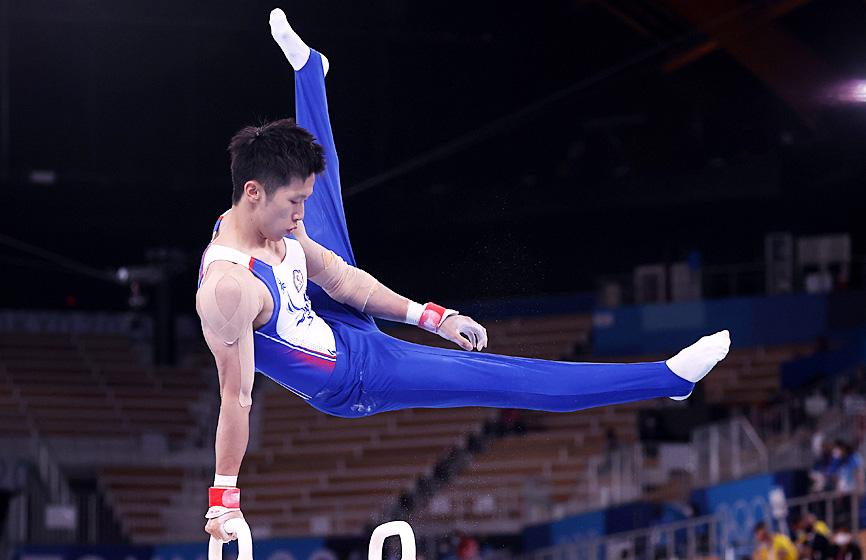For Taiwanese gymnast Lee Chih-kai, his skillful performance of the challenging “Thomas flair” on the pommel horse at the Tokyo Olympics only made him want to perfect the routine further.
The 25-year-old won a silver medal in the pommel horse on Sunday, the first Olympic medal ever won by a Taiwanese athlete in gymnastics.
He nailed his 45-second routine, centered around the move named after late US gymnast Kurt Thomas, in which he skillfully maneuvered around the pommel horse on alternate hands while swinging his split legs in a continuous circular motion.

Photo: EPA-EFE
Yet the score it earned — 15.400 — was not good enough to prevent the UK’s Max Whitlock from winning his second consecutive Olympic pommel horse gold medal with a score of 15.583.
Lee’s 8.700 for execution was the best of any gymnast, even better than Whitlock’s 8.583, but his 6.7 for difficulty was 0.3 points lower than Whitlock’s 7.0.
“I did my best. I have no regrets,” Lee said after his performance. “Right now, I’m the 3.0 version of Lee Chih-kai, and I’ll push to evolve further by beating Whitlock.”
The defeat of the veteran champion would be the birth of “Lee Chih-kai 4.0,” he said, adding that he aims to achieve a Thomas flair maneuver the world has never seen.
As with any gymnast, Lee’s road to the Olympics has been rife with injuries, muscle pulls and general aches, evidenced by the tape covering several parts of his body.
There have also been tears, as seen in an award-winning 2005 documentary, Jump! Boy, featuring seven young gymnasts training in Yilan County, including Lee.
Recalling his more than a decade of training, Lee described the grind of repeating the same routines every day as “boring and demanding.”
However, it is his ability to endure that routine that has set him apart, he said.
“I’m not talented. I just grind more than others,” Lee said.
Born in 1996 in Yilan, Lee started gymnastics at the age of six, coached by Lin Yu-hsin, who is also the coach of Taiwan’s gymnastics team at the Tokyo Olympics.
Lee joined the gymnastics team of Gongzheng Elementary School in Luodong Township (羅東) when he started there as a first grader.
At first, training was not painful, he said, attributing his fondness for the sport to the “sense of achievement” he felt when a new move drew applause.
However, as the training got harder and more serious, physical and mental pain set in.
He and his teammates occasionally shed tears on a big pillar in front of the gym at the school, Lee said, adding that he would hug that pillar crying whenever his mother sent him to train.
He would actually pray that his mother would take him home because she could not bear to see her son in pain, but that never happened, he said.
Despite thinking of quitting the sport several times because of the pain, the harsh training regimen and the sense of frustration that came after failing to execute a routine well, he pressed on.
Lee was 20 years old when he competed in his first Olympic Games in Rio de Janeiro in 2016. There, he fell from the pommel horse, and at that moment “my brain went blank, except for the thought of wondering why my life was so painful,” he said.
In 2018, he completed a Thomas flair routine to win gold at the Asian Games in Jakarta, and he also bagged a gold in the pommel horse at the 2017 Taipei Summer Universiade and the 2019 Napoli Summer Universiade.
From the 1.0 version of Lee Chih-kai in Rio and 2.0 in Napoli to 3.0 in Tokyo, he has steadily improved, and earning an Olympic medal has only pushed him to strive harder.

College basketballer Kaitlyn Chen has become the first female player of Taiwanese descent to be drafted by a WNBA team, after the Golden State Valkyries selected her in the third and final round of the league’s draft on Monday. Chen, a point guard who played her first three seasons in college for Princeton University, transferred to the University of Connecticut (UConn) for her final season, which culminated in a national championship earlier this month. While at Princeton, Chen was named the Ivy League tournament’s most outstanding player three times from 2022 to last year. Prior to the draft, ESPN described Chen as

College basketballer Kaitlyn Chen (陳凱玲) has become the first player of Taiwanese descent to be drafted by a WNBA team, after being selected by the Golden State Valkyries in the third and final round of the league's draft yesterday. Chen, a point guard who played her first three seasons in college for Princeton University, transferred to the University of Connecticut (UConn) for her final season, which culminated in a national championship on April 6. While at Princeton, Chen was named the Ivy League tournament's most outstanding player three times from 2022 to last year. Prior to the draft, ESPN described Chen as a

Robinson Cano spent 17 seasons playing in the MLB in front of all kinds of baseball fans, but he said there is something special about his stint with the Mexican Baseball League’s Diablos Rojos. He is not alone. The league last week opened its 100th season, aiming to keep an impressive growth in attendance that began after the national team’s surprise run at the 2023 World Baseball Classic, and is already surpassing some first-division soccer clubs. After finishing third in the 2023 tournament, many casual fans, some of them soccer enthusiasts disappointed after Mexico were eliminated in the first round in the 2022

In-form teenager Mirra Andreeva on Thursday crashed out of the Porsche Tennis Grand Prix in Stuttgart, Germany, after going down in straight sets to fellow Russian Ekaterina Alexandrova in the last 16. World No. 7 Andreeva, who already has two titles under her belt this season, lost 6-3, 6-2 against the 22nd-ranked Alexandrova in just over an hour. The 17-year-old Andreeva had defeated her elder sister Erika in the previous round on Wednesday, but Alexandrova quickly took control as she claimed her fourth win over a top-10 player this season. The 17-year-old Mirra Andreeva in February became the youngest winner of a WTA